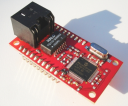Differences
This shows you the differences between two versions of the page.
| Both sides previous revision Previous revision Next revision | Previous revision Next revision Both sides next revision | ||
|
en:netzer:s88 [2012/02/06 23:28] svesch |
en:netzer:s88 [2012/02/17 16:32] svesch GPIO settings added. |
||
|---|---|---|---|
| Line 4: | Line 4: | ||
| The S88 bus is a feedback bus system for model railroad systems. | The S88 bus is a feedback bus system for model railroad systems. | ||
| - | |||
| Up to 32 decentralized slaves connected to each other in a serial fashion controlled by one master device (control unit). The slaves are spreaded around model railroad layout. | Up to 32 decentralized slaves connected to each other in a serial fashion controlled by one master device (control unit). The slaves are spreaded around model railroad layout. | ||
| Line 45: | Line 44: | ||
| Netzer with installed IO firmware (at least Release *1.5pro*) must be configured via the webinterface: | Netzer with installed IO firmware (at least Release *1.5pro*) must be configured via the webinterface: | ||
| - SPI-Master-Mode on the common page (restarting Netzer afterwards is needed) | - SPI-Master-Mode on the common page (restarting Netzer afterwards is needed) | ||
| - | - SPI-Master-settings: Frequency on 5 kHz (for long lines also 1.3 kHz may be tried), SPI mode 2 (Idle state of the clock signal is 1, data is stored on falling edge), sampling of the data in the middle of clock cycle (see picture) | + | - SPI-Master settings: Frequency on 5 kHz (for long lines also 1.3 kHz may be tried), SPI mode 2 (Idle state of the clock signal is 1, data is stored on falling edge), sampling of the data in the middle of clock cycle (see picture) \\ {{s88_spisettings.gif?nolink&|SPI Einstellungen}} \\ \\ |
| - | + | - GPIO settings: In this example SPI_INT and SPI_CS are use as digital outputs. Configure them via the GPIO settings dialog! {{s88_gpio.gif?nolink&|GPIO settings}} | |
| - | {{s88_spisettings.gif?nolink&|SPI Einstellungen}} | + | |



